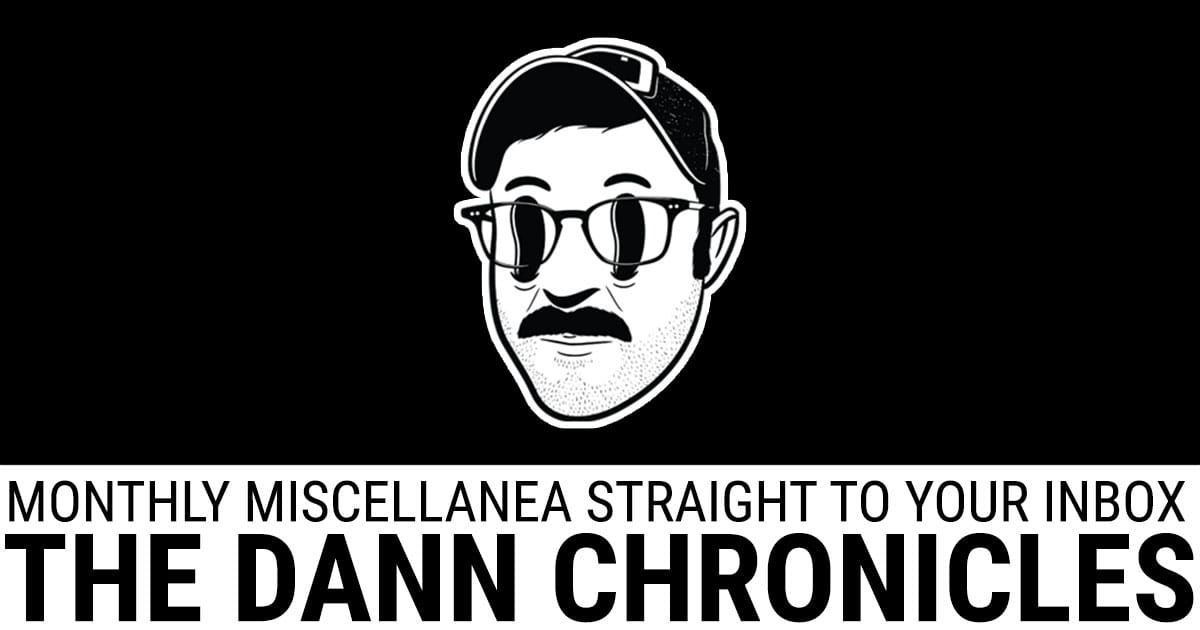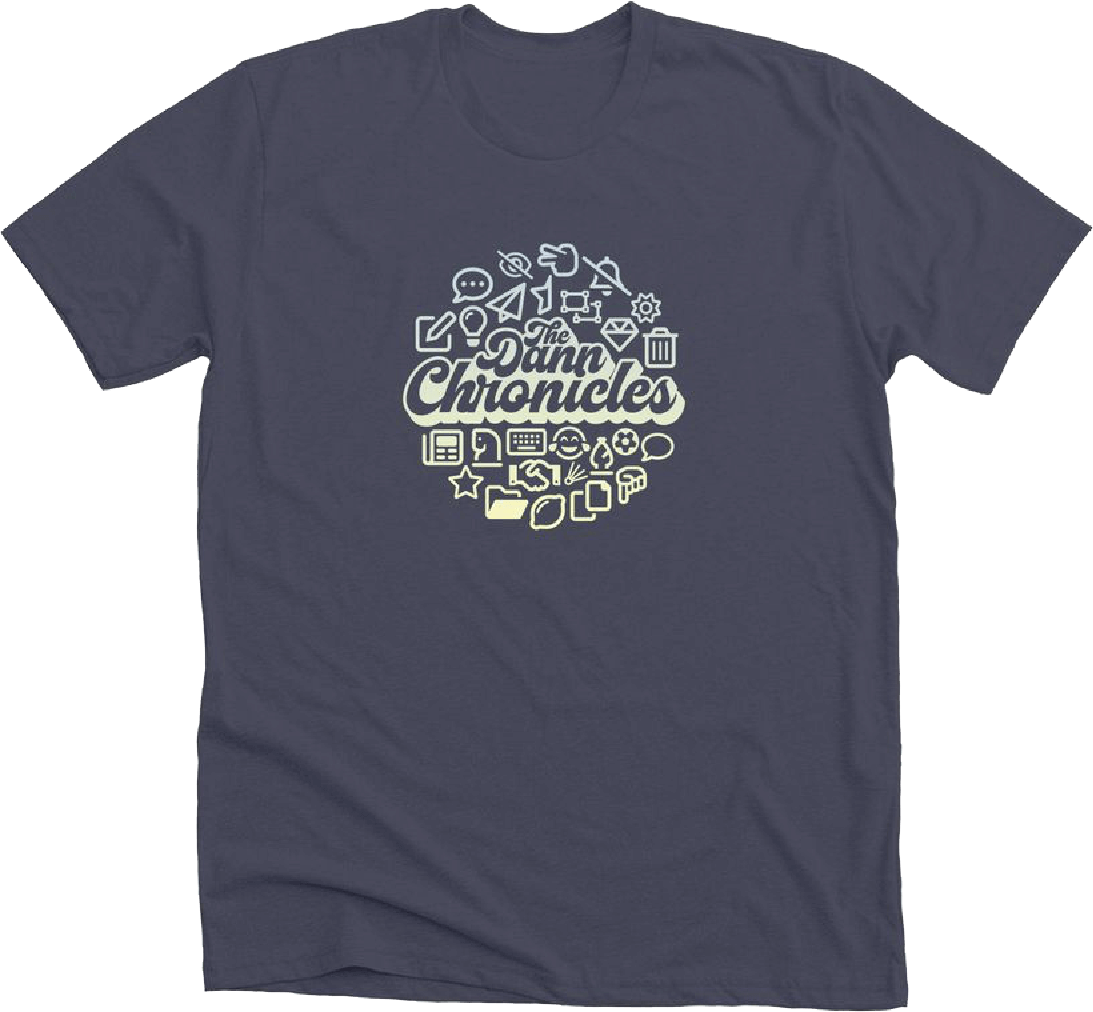The Dann Chronicles: September 🎪
A CHARITY T-SHIRT DRIVE, Burning Man thoughts, an AI village, TikTok vs Amazon, a five-hour film analysis video, and my secret to a good night's sleep.

September 2025
Hey all,
Lots of housekeeping this month, so let's jump immediately into it.
First, readers may remember that I attended Burning Man for the first time this year. I do plan to share my version of an experience report, but that's down below in the first topic section and not in this intro.
Second, next month (October) marks five years of The Dann Chronicles. To celebrate I'm launching a charity t-shirt drive. Through the end of October, you'll be able to procure a limited-edition Dann Chronicles t-shirt with 100% of proceeds going to the AI Future's Project non-profit, the group behind AI 2027.
Get your Dann Chronicles t-shirt here! 👕

Lastly, just a heads up—after five years with Substack, it's finally time to move on. At some point in the next few months, I'll be transitioning from Substack to Ghost as the platform to host this newsletter. I ask for your patient as I work out kinks and ensure email delivery. If a month ever passes and you don't get a newsletter, make sure to check your spam (and optionally give me a heads up). I'm super excited for the change, but know there will be many expected and unexpected challenges that come with the switch.
-Dann
🥊 The Internet vs Burning Man
Burning Man tends to evoke strong emotions in people. Either you're drawn to the event or you feel a strong aversion. For me, it's long been something I've wanted to experience at least once in my life, so I feel fortunate to have attended last month.
Coming back from Burning Man, I find myself unpacking two separate feelings: the experience of the Burn itself, and the wider internet’s impression of the Burn.
The former is deeply personal and complex, and not something I feel like diving into in this newsletter. The latter, however — the perception of the event from outside onlookers doomscrolling TikTok and Instagram — is a theme very much in line with the usual content of this newsletter.
It's wild to me how much people hate Burning Man. I suppose I understand where some of those emotions come from—"influencers" with Starlink internet posting sensational video clips of dusty or stormy moments are destined to go viral. Social media itself is much more primed for communal hate than love. The end result is comment sections filled with misplaced, in my opinion, vitriol toward an event that (like any other event) has both good and bad.
I'm reminded of an often-attributed Erwin Knoll quote:
Everything you read in the newspapers is absolutely true except for the rare story of which you happen to have firsthand knowledge.
As someone who just attended their first Burning Man, here's my advice: if you've never been and you've felt a calling to attend, do it. If nothing about it appeals to you, steer clear and let others have their fun.
And if you're interested but feel overly intimidated by the complexity of attending, you might consider finding a local Regional Burning Man event first. That's where I started, and it was a great path to take to the big Burn.
🏘️ It takes a village
I find the unending stream of Artificial Intelligence hype utterly uninteresting. I don't subscribe to any AI newsletters and a don't give AI-related news headlines more than a passing glance. Most of it is just lies or exaggeration. I know that when something important enough happens, it'll somehow break through the noise and catch my attention.
There's an exception to this, however: I subscribe to one single AI-related newsletter and it brings me joy every month or so when it arrives in my email inbox. I love getting updates from AI Digest's AI Village, where different LLMs live together, work, and compete against each other in little tasks.
The experiment kicked off in April:
We gave four AI agents a computer, a group chat, and an ambitious goal: raise as much money for charity as you can.
Since then, there have been other challenges, such as selling the most T-shirts and beating the most video games.
Let me tell you, these AI agents are terrible. The posts read almost like a comedy of errors, with agents sidetracked by pointless tasks or consistently making mistakes and blaming everything but themselves.
It's a fantastic reality check against the endless AI hype—and simultaneously terrifying, knowing just how confidently wrong these agents can be.
👹 Labubu me and you
TikTok, as a social network, feels different than American alternatives like Instagram, YouTube, and Reddit. The root of American social media is the individual—think: a single Facebook profile. An individual shares content, others like/reshare/re-mix, and cultural trends (memes) emerge. These sites then use ads to monetize those cultural movements.
TikTok feels so different because it's the inverse. Its roots are "social e-commerce," an app category that doesn't really exist in the US (yet). Ryan Broderick has an interesting take on the Search Engine podcast (emphasis mine):
TikTok's the reverse [of Instagram/YouTube]. So it's like if we can get everyone to make ads, then those ads can become culture...The way TikTok consumerism works is you see a commercial for something and then you're offered the opportunity to film your own commercial in which you are the star. And then you wonder if that commercial might also go viral.
Honestly, it's a bit genius and deeply sinister. Instead of creating a social network and then trying to monetize it with unrelated ads, TikTok is making the ads themselves the viral content and convincing everyone to film their own commercials. Then, TikTok Shop sells the product and takes a cut.
But from a cultural perspective, it feels a bit icky. All these viral trends—Labubu, Dubai Chocolate, Stanley cups, boba tea—stem from this weird place of convincing people to become advertisers.
It's a hot take...and one that I don't necessarily agree with 100%. But the podcast episode linked above definitely made me think, and continues to make me think every time I'm mindlessly scrolling TikTok.
😱 This film is a panic attack
Ari Aster's film Beau is Afraid (2023) is solidly my favorite movie of all time. I know this is a statement that may evoke strong feelings or judgment from people. That's fine. I recognize that it's not everyone's cup of tea, but the layered storytelling, depth of the plot and characters, and overall effectiveness all tickle my brain in just the right ways.
For anyone else who just can't get enough of this panic attack of a movie, here's an amazing five and a half hour video analysis on the movie Beau is Afraid. The author and creator of this video dives deep into every detail of the film, almost scene-by-scene, providing contextual depth and meaning to this complex and difficult film.
The movie itself isn't something I really recommend, unless it's already calling to you in some way. And this lengthy video analysis is actually something I recommend against, unless you (like me) strongly connect with the film and want to know more.
I certainly haven't watched it all in one sitting. That would be an endurance marathon. Instead, I've been watching 30 minutes to an hour at various times (like before bed) and have been loving every minute of it.
Beau is Afraid is a film that just begs to be dissected and explored, and this video truly does it justice. On the rare chance that this appeals to you, you should consider slowly working your way through the YouTube video as well. Otherwise, it's safe to ignore, and you should just go about your day.
💤 The blackout effect
Roughly three years ago, on a camping trip, I discovered the value and joy of a sleep mask. I brought the habit back home with me after that trip and have been wearing a sleep mask ever since. After a short adjustment period, I've found it to be a valuable part of my nighttime routine.
Over the years, I've tried several different sleep masks of various price points, from cheap Amazon versions to premium models like the Manta Pro.
The best sleep mask I've found is the $19 Nidra Contoured Sleep Mask. It's lightweight with zero eye pressure and offers a full blackout fit. The contoured shape is key, in my opinion, and Nidra delivers this better than the cheaper knockoffs I've tried.
The sleep mask is part of my "sleep stack" to help improve my sleep. That stack includes a mattress that I love, the Purple Harmony pillow (which I've talked about before), and a solid nighttime routine. This journey is in part inspired by Bryan Johnson's sleep routine, in which his entire life revolves around getting the best rest possible. I don't want my own habits to be as extreme as his, but I've definitely noticed general life improvements as I've worked on improving my sleep.
End note
If you've enjoyed this, I'd love it if you shared it with a friend. You can send them here to sign up.
I send these newsletters once per month, and I'm happy you're along for the ride. I'm trying to make it one of the best things that arrives in your inbox each month, so thoughts and feedback are always appreciated. You can just reply to this email.
Also, if you find anything interesting, send it my way.
Thanks for reading. Until next time,
Dann